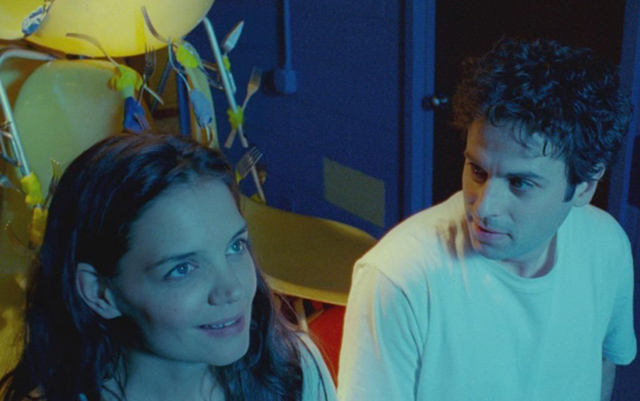CHICAGO – Patrick McDonald of HollywoodChicago.com appears on “The Morning Mess” with Dan Baker on WBGR-FM (Monroe, Wisconsin) on March 21st, 2024, reviewing the new streaming series “Manhunt” – based on the bestseller by James L. Swanson – currently streaming on Apple TV+.
Interview: Director Paul Dalio, Luke Kirby of ‘Touched With Fire’
CHICAGO – The status of individual mental acuity and control is like the fingerprint of the brain. There are disorders that have been diagnosed, which alters that fingerprint into different types of behavior. A new film, “Touched with Fire” – directed by Paul Dalio and featuring lead actor Luke Kirby – seeks to bridge an understanding of Bipolar Condition, the particular mental journey of highest (and ultra-creative) highs and mind numbing lows.
That was a one sentence attempt at trying to explain a complex state of being – an affected individual’s behavior is like a snowflake, different in all. In his new film “Touched With Fire,” writer/director Paul Dalio seeks to provide normalization to the Bipolar nature, in a fictional narrative. Actor Luke Kirby, a TV and film journeyman, has a career defining performance as Marco, a writer who goes from independence to institutions to his parent’s home, never seemingly under control. At another in a series of clinics, he meets Carla (Katie Holmes), and they begin a relationship.

Katie Holmes and Luke Kirby in ‘Touched With Fire’
Photo credit: Roadside Attractions
The narrative was inspired by a non-fiction clinical book with the same title, by Dr. Kay Redfield Jamison. She expresses the same sentiment as the film, especially in the realm of the creative artist. Several of the greatest artists in history suffered in various degrees with Bipolar Condition (diagnosed and undiagnosed). Dr. Jamison – and Paul Dalio – are simply arguing that the condition can be both utilized in the human experience and treated at the same time.
Paul Dalio and Luke Kirby spoke with HollywoodChicago.com on the adventure of creating this vital and different type of story, with all the obstacles and accomplishments.
HollywoodChicago.com: Paul, this was a personal project for you, since you’ve dealt with Bipolar Condition in your own life. What do you want people to ultimately understand about this manic state of mind in presenting this film?
Paul Dalio: I want people to see the beauty of that condition through the eyes of the characters. In doing that, they can allow people who have the condition to be more accepting of it, and to be open about it. That would be a contribution to the people who have it, and considering that 38% of the Pulitzer Prize winning poets are Bipolar, to think about how much these individuals have contributed to the human spirit.
Also I want the audience to think about how many people are hiding in the shadows with the condition. I want the film to take away the stigma of thinking of this as a disease and an illness to be crushed. I want those in the condition to shine and contribute to the human spirit.
HollywoodChicago.com: Luke, in portraying a mental disorder as an actor is a slippery slope. How did you, in working with Paul, approach a performance mode that never felt like it was going too far?
Luke Kirby: Basically, we got to know other and openly trade stories, and had some time to prep. As far as the ‘going too far’ thing, the great thing about film art is that you can go too far, and with multiple takes nobody has to see it. [laughs] In doing this type of portrayal, I had to remove the concept of ‘going too far,’ to let discovery flow. I don’t have the talent to either control a performance or intellectualize it. For me, it is what it’s about, flinging mud at a wall to see what emerges.
HollywoodChicago.com: Paul, we’re all part of a society, which in interaction and context, has developed a view of what is a ‘normal’ state of being. When, in your opinion, is that normalcy compromised when dealing with a manic condition? Does it feel like the world needs to catch up to you or do you have to catch up with it?
Dalio: Do you think you can love too much? Or experience too much beauty, at the cost of too much pain? Do you think when art is defined by expressing so much beauty and so much pain, just to be able to cope with both – and bring other people something creatively beautiful at the cost of that pain – that we can draw a line of ‘normalcy’? It’s important to think about.
Vincent van Gogh painted ‘The Starry Night’ from the window of his sanitarium during a manic episode, we all get to look at that sky now. The thing is, it has to come from the person experiencing the condition to make that choice. And I feel that the people who are making the choice misunderstand the situation, when it comes to either/or. Because of that, doctors are afraid to acknowledge that this is a gift, and can be beautiful, because they don’t want to romanticize it.
HollywoodChicago.com: What if those doctors were able to make that acknowledgement, in your view?
Dalio: If they could say that to their patients, it could be a way to treatment, as in both working on it and preserving it. That could give a patient the faith to fully experience that beauty, without reliving the torment. Vincent van Gogh was sane when he painted that piece of art, because when you you feel the mania and depression, you have all the heaven and hell your heart has ever experienced that you can tap into, to be able to create something that can last several lifetimes.

Director Paul Dalio Considers a Shot on Set in ‘Touched With Fire’
Photo credit: Roadside Attractions
HollywoodChicago.com: Luke, what part of Marco was most difficult to access, and how did you overcome that difficulty?
Kirby: I guess it was between me and Paul, in determining who Marco was. It was a barometer, in the sense of ‘where is the authenticity?’ It was a matter of exploring, and searching, so the challenge was finding what was enough or too much. Paul liberated me from that, and after that we found the rhythm by exploring.
Dalio: But Luke never went too far. He might not know what it was like when he began the role, but as long as he trusted me to allow him to go where he wanted to, and know that I would tell him when it was a bit off. But ultimately it was from him and his own intuition – his emotional range and imagination was extraordinary, and he fully fleshed it out.
HollywoodChicago.com: Paul, as we talked earlier, labels and the medical field creates stigmas in regard to the Bipolar condition. What can be done to change the direction of how we talk about it?
Dalio: If I were to peruse a survey of label options, as they exist now, they either sound like a time bomb disorder or manic depression or Bipolar divide or mental illness. How can I find an identity in that? It certainly isn’t something I can bring up in conversation, without a reaction of judgement or even fear.
That is the beauty when I discovered the label ‘Touched With Fire.’ That book defined it for me, I could be that. And we just happen to be living in one age of society that put these various labels on the condition. In Aristotle’s time, it was the ‘inspired state.’ In the Native American cultures, you were the shaman. Labels and language creates realities, even if they are false.
Kirby: The sense that I am getting, as we move forward, is that the term ‘Touched With Fire’ does bridge this gap that we have around mental health issues. If this film can be part of this bridge building, and there is dialogue that occurs afterward, then the chasm between ‘sane’ and ‘insane’ is not so vast. We can create a deeper understanding.
HollywoodChicago.com: Luke, chemistry is important in a movie romance. What did you and Katie Holmes do to develop that chemistry?
Kirby: We had a bit a time to rehearse, which is a good place to lock in with another actor. I like to show that I am locked in, so that she could in turn lock in, and then we were good to go. You can tell with a fellow actor if they’re in the sandbox – were they here to play or not? If they are, you’re good to go. I figured it out pretty quick, I can’t speak for Katie. [laughs]
Dalio: It was cool to watch because it was like two fires burning simultaneously, with each flame fueling the other.
HollywoodChicago.com: Paul, your executive producer on this film is Spike Lee, who mentored you through your NYU film studies. What is most misunderstood about the public persona of Mr. Lee?
Dalio: That he is a prick or has an axe to grind or has an attitude. The truth is he is just honest and straight forward, and doesn’t give a crap what people think.
Kirby: He is one of the most prolific artists of our time, and is telling the American story. And the story he has been telling for the past thirty years, has surfaced recently in many forms, both in fiction and reality.
Dalio: He has had a big impact on all of us as filmmakers, because he is a ground breaker. And he never is tempted to be safe or redundant, he continues to break barriers.
 | By PATRICK McDONALD |


